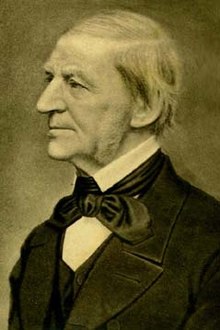At the beginning of the semester I was but a babe in the epistemological woods with respect to how to approach literature, much like Young Goodman Brown in Hawthorne's story of the same name. Unfamiliar with the journey narrative structure, I was accustomed to reading in a detached, linear fashion, oblivious to the deeper, more profound aspects within: a forest was just a forest, a city a city, and so on. The ways in which various settings symbolized the protagonist's inner state was a concept which had hitherto eluded me. I had left my "home" of passive reading and entered the "woods" in which I was enveloped by myriad new ways of approaching literature; I didn't understand them all at once, but with guidance new hermeneutical pathways were gradually elucidated before me. I had left my "point A" and found myself deep in "point B."
With Emerson, and his address "The American Scholar" I seemed to have come to a clearing in the aforementioned woods. Emerson's declamation of the sanctity of free thought and intellectual independence imbued in me a confidence vis-a-vis literary scholarship that had long lay dormant in me. Emerson's assurance that, "In self-trust, all the virtues are comprehended. Free should the scholar be, -- free and brave. Free even to the definition of freedom, 'without any hindrance that does not arise out of his own constitution'" opened up for me new avenues of thought, and as David Hume awoke Immanuel Kant from the latter's "dogmatic slumbers" so Emerson awoke me from mine. His inspiring words, along with your guidance, Prof. Hanley, bolstered my inclination to think and to read creatively, to unfetter myself of the chains which had bound me to thinking only in black-and-white terms; that often there is more profundity lurking beneath the surface of literature.
When confronted with T.S. Eliot's "The Waste Land" the confidence I had gained in my ability to more astutely analyze and interpret literature was violently shaken. His deliberate obscurantism, conflicting imagery, and non-linear narrative structure threw the proverbial monkey-wrench in my hermeneutical machinery. When intellectually overwhelmed by such works I rely on what I know that might aid me in my understanding of them. In this case I looked to the historical context in which "The Waste Land" was written that I might make some sense of it. The poem's difficulty lies chiefly in its departure from traditional literary norms. This aberration can be made sense of when one considers that for the first time in human history a war had been fought on a global scale with implements of violence and destruction never before witnessed. The works of Eliot and other modernist American writers such as Ernest Hemingway are recommended by their nonpareil literary representations of the early 20th century Zeitgeist: a groping for understanding and apperception of the world in the aftermath of a cataclysmic event which had claimed millions upon millions of human lives and changed the physical landscape of some of the world's great cities. Eliot's (and Hemingway's) works are often identified with exile--and rightly so--however, it is not merely a physical exile to which their writing speaks; it is an epistemological one as well. Typically one looks to the exterior world for order, for causal and hierarchical anchors to which one can affix oneself to a comprehensible reality. These anchors were rent free from their grounding by the calamity of World War I, leaving intellectuals and laypeople alike adrift in a sea of confusion. "The Waste Land" captures this feeling of waylaid rationality and social orderliness by the selfsame literary techniques which make it so difficult upon first reading. This notion is best captured in the following line which we have discussed at length in class: "Bin gar keine Russin, stamm’ aus Litauen, echt deutsch." This quote represents the crisis of identity felt by individuals and the world as a whole as they and it were left to pick up the pieces of a world ravaged by war.
Cormac McCarthy's The Road, while thematically analogous to "The Waste Land" in that its focus is on man coping with a desolated world, holds to the more traditional A-B-A journey narrative shared by so many of the American literary works we have examined during the course of the semester. Its similarities with the American literary canon do not end there however: the epistemological quandary embodied by the road itself and the unforeseeable dangers attending it are strikingly reminiscent of those represented by the forest in "Young Goodman Brown"; the central protagonist's notion of his and his son's "carrying the fire" brings to mind the call for moral rectitude of Emerson in "The American Scholar"; the spiritual crises undergone by the man remind us of Hemingway's Krebs. What all of these American works seem to share in common is their characters' desire to make sense out of a senseless world, to exercise their free agency where it would be accosted, to manifest for oneself a destiny of his or her own choosing, unrestrained and unmolested by individuals and society alike. To my mind these are the characteristics sine qua non of American literature, and had it not been for this class they would not be nearly as recognizable to me as they are now. Thank you.



